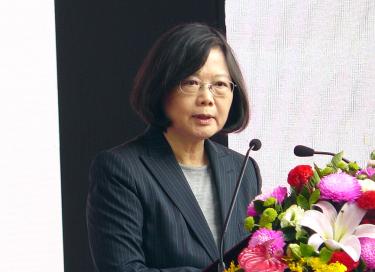The Presidential Office yesterday stayed mum after US president-elect Donald Trump questioned the necessity for Washington to adhere to its long-standing “one China” policy.
In an interview with the Fox News Sunday program, Trump first denied that a Dec. 2 telephone call between President Tsai Ing-wen (蔡英文) and himself was planned weeks in advance.
“Not weeks. I took a call. I heard the call was coming probably an hour or two before,” Trump said.
He then went on to question the need for Washington to stick to its “one China” policy.
“I fully understand the ‘one China’ policy, but I don’t know why we have to be bound by a ‘one China’ policy unless we make a deal with China having to do with other things, including trade,” he said.
Presidential Office spokesman Alex Huang (黃重諺) yesterday morning said the office had no comments about Trump’s remarks on the Fox show.
Huang also declined to respond directly to Trump’s claim that he only learned that Tsai was to call him shortly before it occurred.
The contact process and details regarding the call between Tsai and Trump were conducted in accordance with the customary practices for Taiwan-US interactions, Huang said.
“We do not have any further explanation,” he said.
The US has endorsed a “one China” policy since 1972, when then-US president Richard Nixon signed the Shanghai Communique with then-Chinese premier Zhou Enlai (周恩來).
Washington severed diplomatic ties with Taipei in 1979 and switched recognition to Beijing. Since then there had been no known direct communications between the leaders or prospective leaders of the nations until the Dec. 2 telephone call.
Former president Ma Ying-jeou (馬英九) also downplayed Trump’s comments on the “one China” policy, while the Chinese Nationalist Party (KMT) urged the US to take into account stability across the Taiwan Strait before commenting on cross-strait issues.
Ma was asked for a comment as he attended a forum in Taipei marking the 70th anniversary of the nation’s occupation of Itu Aba Island (Taiping Island, 太平島) in the South China Sea.
“Since Trump has not yet been inaugurated, it makes more sense for me to wait until after he takes office on Jan. 20 to comment on the matter to see if he still appears to stand by this stance,” Ma said.
As for the possible impact of the phone call on Taiwan-US-China relations, Ma said the situation was too uncertain for him to make a clear judgement.
However, the KMT appeared more worried about Trump’s remarks. An unstable Taiwan Strait could destabilize Northeast Asia and even the entire world, the party said in a statement.
“Therefore, we urge any country to give priority to cross-strait stability before giving their opinions about issues related to the Taiwan Strait,” KMT Culture and Communications Committee deputy director Hu Wen-chi (胡文琦) said.
Hu said cross-strait tensions have already been raised due to Tsai’s refusal to acknowledge the so-called “1992 consensus” and her failure to produce any pragmatic solutions to cross-strait issues since taking office.
“Tsai, by talking on the telephone with Trump, gave Beijing a slap in the face,” Hu said.
“We urge the president to refrain from putting the lives of 23 million Taiwanese at risk, and to let cross-strait peace and stability take precedence,” he said.
The “1992 consensus” refers to a tacit understanding between the KMT and the Chinese Communist Party that both sides of the Strait acknowledge that there is “one China,” with each side having its own interpretation of what “China” means.
Former Mainland Affairs Council chairman Su Chi (蘇起) said in 2006 that he had made up the term in 2000.
Source: Taipei Times - 2016/12/13





















